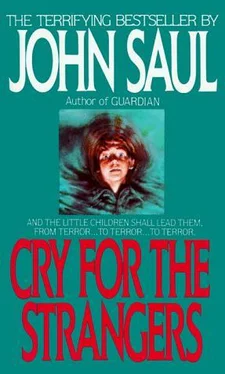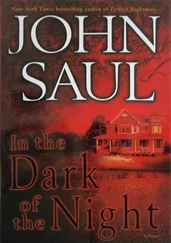Before he could ask Elaine about it their food arrived and the Randalls began eating, though every now and then Brad’s glance moved curiously to the man whose clothes fit and who had just cut off his beard. The man kept his eyes on his plate and ate steadily, not rushing, but wasting no time. Once he signaled for more coffee. The waitress poured it willingly but didn’t stop to chat for a few seconds as she did with everyone else in the café. When the man finished his meal, he dug into his pocket, dropped some money on the table, and started to leave. But as he moved toward the stairs his eyes suddenly met Brad’s, and he stopped short. A grin lit his face and he moved quickly across the room, his hand extended in greeting.
“Dr. Randall? Is it really you?”
Brad recognized him then and stood up. “Glen Palmer! For Christ’s sake! I’ve been sitting here all along, sure I recognized you, but I couldn’t place you.”
“It’s the beard,” Glen Palmer answered. “I shaved it off when we moved out here.”
“Sit down. This is my wife, Elaine. Honey, this is Glen Palmer, the father of Robby Palmer.”
Elaine’s brow furrowed with puzzlement, then cleared as she extended a hand in greeting. “Of course,” she said, smiling. “How is he? Brad tells me there was some kind of miracle.”
“That’s the only word to describe it,” Palmer agreed as he sat down. Brad looked at him expectantly, wanting to bombard Palmer with questions but reluctant to embarrass the man.
Robby Palmer, Glen’s nine-year-old son, had been under Brad Randall’s care for nearly three years, a victim of hyperkinesis. It had been a particularly severe case. The first time he had seen the child, Robby was six years old, and unable to sit still for more than a second or two, talking constantly, compulsively, his hands and feet always moving, sometimes only nervously, but more often destructively. Brad had quickly learned to remove all breakable things from his office when Robby Palmer was coming. A small boy with an angel’s face and a “devil” within. There was something inside him, some malfunction in his nervous system, that kept him moving, relentlessly, exhaustingly, sometimes frighteningly. The child had been subject to sudden fits of senseless rage, and it had been during these fits that his violence would surface, his small hands darting out to seize the closest objects — any objects — and hurl them at the nearest window, wall, or person. Brad had a memory, one he would not soon forget, of two pieces of Steuben crystal, his two favorites, bought when he could ill afford them, that had been smashed irreparably one afternoon by a mildly upset Robby Palmer, who had then stared at the splinters of glass, puzzled, as if he wondered what had happened to them. There had been no evidence of remorse in the child, no fear of punishment. Only a second’s detached coldness, as if the shattered figurines had nothing to do with himself, before the compulsive nervous motion took hold again.
One day, a few months ago, Robby Palmer had stopped coming to see Brad Randall, and Brad had never understood why. When he had tried to talk to the Palmers about it they had only said there was a miracle and left it at that. Silently, Brad Randall wondered if Clark’s Harbor had anything to do with that miracle. Now Glen told him.
“You won’t believe it,” he was saying. “The change in Robby is absolutely incredible. Ever since we brought him out here. He’s calm, Dr. Randall. He’s still active, but it isn’t like it used to be. Now he’s like other children.”
“But what caused it?” Brad asked.
Glen Palmer shrugged. “I haven’t any idea. We came out here on a camping trip and stopped just north of town, at a place called Sod Beach. And Robby calmed down. Just like that,” he said, snapping his fingers. “And he stayed calm as long as we were on the beach. So we moved out here.”
“It doesn’t make any sense,” Brad mused.
“Maybe not,” Palmer agreed. “But we don’t question it. Whatever demons were in him, they’re gone now. Gone forever.”
Brad’s fingers drummed softly on the table top as he turned Glen’s statement over in his mind, trying to figure out what could have cured Robby’s disorder. It had been a problem case too long, and Brad was always skeptical of “miracles.” “I wonder if I could see him?” he asked.
“Why not?” Glen agreed amiably. “He always liked you.”
“Tell that to my receptionist,” Brad chuckled. The receptionist had lived in terror of Robby’s visits to the office, and often made up reasons not to be there when the child arrived.
Glen glanced up at the clock on the wall. “Tell you what,” he said, “why don’t you come out to our place this evening or tomorrow morning? Are you staying in town?”
“I guess we might as well,” Elaine said uncertainly, knowing Brad would want to. “Is there a decent place?”
“The Harbor Inn, down on the waterfront,” Glen said. “It’s the only place.” He stood up. “Look, I’ve got a lot to do this afternoon. See you later, okay?”
“Sure,” Brad said. Before he could say anything else Glen Palmer hurried away from their table and disappeared through the door.
“That was sudden,” Elaine commented.
“It was, wasn’t it?” Brad agreed. Then he noticed that as soon as Palmer left a buzz of conversation had started among the remaining patrons of the café.
“Well,” a woman at the next table said a bit too loudly to her lunch partner. “At least he’s shaved off that awful beard.”
“Not that it matters,” the other woman replied. “He still doesn’t fit in around here.”
“You’d think he’d get the message,” the first woman said. “Everybody else like them has caught on right away and left us in peace.”
“My Joe offered to buy that building of theirs just yesterday,” the second woman said. “And do you know what Glen Palmer told him? He told him it wasn’t for sale. Joe told him he’d better sell while he could, before he ruined it completely, but Palmer told him he wasn’t ruining it — he was remodeling it.”
“Into an art gallery,” the first woman sniffed. “What makes him think he can make a living with an art gallery in Clark’s Harbor? And that wife of his — makes pottery that looks like mud pies and thinks people will actually buy it!”
The conversation continued to buzz around them. From the few words Brad could catch, he knew they were all talking about the same person — Glen Palmer. Everyone, apparently, talked about him. No one had talked to him.
“Maybe I was wrong,” Brad heard Elaine say. She also was listening to the comments from the other tables.
“ ‘New England,’ you said.” Brad gave her a wry smile. “Sounds to me like you were right on target. These people don’t seem to like strangers any more than villagers do anywhere else.”
“It’s kind of scary, isn’t it?” Elaine asked.
Brad shrugged. “I don’t know. I think it’s more or less to be expected. We’ll probably get the same treatment no matter where we go. But it’s just a matter of time. People have to get used to you, particularly in places like this. I’ll bet a lot of people in this town rarely see someone they don’t know. When they do they get suspicious.”
Elaine fell silent and continued eating her lunch. The psychiatrist in Brad was enjoying himself, finding the hostile attitudes of the locals “interesting,” and she wasn’t sure she approved. But, she quickly reminded herself, you knew when you married him that he was a psychiatrist; you have nothing to complain about. She concentrated on looking out the window and did her best to ignore the chatter going on around her.
It wasn’t until they were finishing their coffee that Brad spoke again.
Читать дальше












